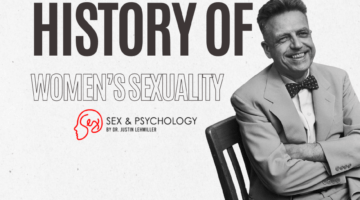Why More Men In Hollywood Aren’t Speaking Out About Sexual Harassment of Women—And How We Can Change That
October 13, 2017 by Justin Lehmiller
Dozens of allegations of sexual harassment and assault against Hollywood producer Harvey Weinstein have surfaced in the last two weeks (see here for a complete list). These allegations have prompted several celebrities to speak out about the issue. However, many have noticed that the celebrities who have spoken out so far are disproportionately female, which has led many—including writer and director Lena Dunham in a NYT op-ed—to ask why the men of Hollywood have largely been silent.
Many different explanations have been offered. For example, Dunham suggests (among other things) that perhaps men don’t see it as being their problem. Others have argued that it reflects a broader culture of misogyny in Hollywood. While these factors might very well be playing a role, my training as a social psychologist points to a few other possibilities.
One of these is something that we see all of the time in situations where people who are desperately in need of help don’t end up receiving it: diffusion of responsibility. The main idea behind this concept is that the more people there are who witness an emergency situation, the less likely it is that the victim(s) will receive help [1].
Why is that? It’s not because the bystanders in these cases fail to recognize the problem. It’s not that they are apathetic or don’t care either. Rather, it’s because when groups become larger and larger, each individual feels less and less personally responsible for helping. This occurs, in part, because the more people there are around us, the more we worry about what other people might think if we step in and take action. For example, some might worry about the consequences of saying or doing something wrong or incorrect.
Diffusion of responsibility is a powerful social force that, unfortunately, leads many people who would otherwise be able to help to instead sit on the sidelines, even in life-or-death situations. The good news is that it’s not an insurmountable force, though. It’s possible to break through this diffusion by having someone step up and take responsibility. When this happens, others tend to follow suit.
Applying this to the Weinstein case, what this suggests is that if some particularly powerful and prominent men in Hollywood—the ones who actually have the power to change the culture—start speaking out about the sexual harassment and assault faced by women, others are likely to follow and real social change is likely to occur. However, as long as the men with the most power stay silent, men will largely remain bystanders and the harassment will probably continue.
Beyond diffusion of responsibility, another factor that I suspect is at work here is simple self-interest. If being a social psychologist has taught me anything, it’s that we act out of self-interest more often than not. In fact, even when acting out of self-interest means we end up worse off than acting in the interest of the common good, we still tend to pursue self-interest. For example, ever hear about this thing called the “tragedy of the commons?” Incidentally, it’s for this reason that I’m thinking of renaming my Social Psychology course and calling it “Why People are Assholes” instead. It has a nice ring to it, no?
Going back to the Weinstein case, I see the silence of men in Hollywood as reflecting self-interest because these guys don’t take on any risks to their image or career by remaining silent. Staying silent allows them to go on with business as usual and maintain their successful careers. By contrast, speaking out carries certain risks.
For example, when actor Ben Affleck recently tweeted a condemnation of Weinstein, he was promptly accused of hypocrisy, with many pointing to instances in the past in which he treated women in inappropriate ways. Affleck’s tweet quickly turned into nothing short of an unmitigated public relations disaster. The concern is that other men in Hollywood will look at the response to the Affleck tweet and decide to stay silent because they don’t want to risk being accused of hypocrisy either.
Overcoming people’s tendencies toward self-interest is tough. So is there anything we can do about it? Well, one possibility would be to change the rewards and costs associated with the choices that men in Hollywood are facing today. As long as staying silent continues to be seen as the “safe” and easy thing to do, it’s the option that most will choose. However, if staying silent comes to be seen as the less desirable option—for example, if it becomes associated with being complicit in a culture of sexual harassment and abuse—that changes the terms in a dramatic way. Speaking out then becomes not only the self-interested choice, but also the right thing to do.
Want to learn more about Sex and Psychology? Click here for previous articles or follow the blog on Facebook (facebook.com/psychologyofsex), Twitter (@JustinLehmiller), or Reddit (reddit.com/r/psychologyofsex) to receive updates.
[1] Darley, J. M. & Latané, B. (1968). Bystander intervention in emergencies: Diffusion of responsibility. Journal of Personality and Social Psychology, 8, 377-383.
Image Source: 123RF/Sam Aronov

Dr. Justin Lehmiller
Founder & Owner of Sex and PsychologyDr. Justin Lehmiller is a social psychologist and Research Fellow at The Kinsey Institute. He runs the Sex and Psychology blog and podcast and is author of the popular book Tell Me What You Want. Dr. Lehmiller is an award-winning educator, and a prolific researcher who has published more than 50 academic works.
Read full bio >


